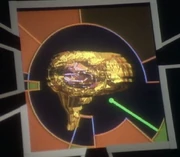
A medical scan of a Humanoid brain
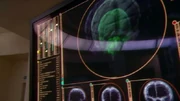
A medical scan of a Vulcan brain.
The brain is the part of the central nervous system that is the center for regulation and control of the body.
The workings of the brain[]
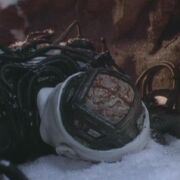
An open Borg skull showing the brain of a Borg drone
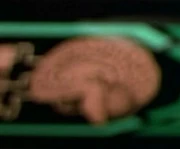
A graphic of a brain on Banea
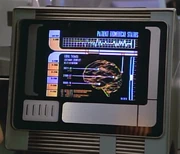
A status of Tom Paris' brain in 2371
The brain is made up of neurons that make use of chemical reaction and electricity by way of neurotransmitters to function. Each brain has a unique circuitry pattern.
The mind is also the house of consciousness, subconscious, metaconscious, thought, memory, emotion, the ability to dream and the powers of extrasensory perception by way of psionic energy.
- See: Emergent property
According to Doctor Leonard McCoy, by the 23rd century, medicine had learned to tie into every Human organ except for the brain, which was what life was all about. (TOS: "The Menagerie, Part I")
According to Doctor Beverly Crusher in the 24th century, headaches were once quite common in the days before the brain was charted and the nature of pain was understood. (TNG: "The Battle")
The brain can have extremely powerful effects on a person's body. Under certain circumstances, medical patients have been known to alter their own blood pressure, lower their body temperature and even manifest a tumor in response to psychological stimuli. The Clown, an artificial being which depended on input from living brains, used this to his advantage in keeping several members of Viorsa's species, and later Harry Kim and B'Elanna Torres, captive. When an individual tried to leave the Clown's artificial environment, he would begin to raise their noradrenaline levels by pretending to cut off their heads with his guillotine. With enough stress, he could induce a heart attack and literally scare the individuals to death. (DS9: "Things Past"; VOY: "The Thaw")
A hard blow to the neck from an opponent in a boxing match will collapse the carotid artery and stop the flow of blood to the brain. (VOY: "The Fight")
Dopterians, Breen and Ferengi have a four lobed brain structure, which can not be read by telepathic species. (TNG: "Ménage à Troi", "The Loss"; DS9: "The Forsaken")
In many, but not all species, hallucination is a sign that the brain is malfunctioning. Many cultures purposely alter their perceptions of reality for spiritual or recreational reasons. The Denobulans, for example, hallucinate to reduce stress. Some Native American cultures self-induce hallucinations to experience a vision quest.
The Banea have the ability to place memory engrams inside a person's brain. This method is incompatible with Human brain physiology. (VOY: "Ex Post Facto")
Parts of the brain[]
Energies of the mind[]
- Bio-neural energy
- Electricity
- Electropathic residue
- Neural energy
- Neurogenic energy
- Psionic energy
- Theta waves
Brain technologies[]
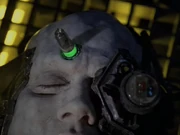
A Cortical node on a Borg drone
- Altonian brain teaser
- Cortical array
- Cranial implant
- Neural network
- Neuro-stabilizer
- Neurogenic pulse
- Neurolytic emitter
- Synaptic processor
- Termination implant
Brain scanners and probes[]
Mind control technology[]
Technologies of repair[]
Interface and communication technology[]
- Cortical implant
- Cortical node
- Cortical processing subunit
- Neural interface
- Neural processor
- Neural transceiver
- Neurogenic interface
- Psi-wave device
- Synaptic stimulator
- Synaptic transceiver
Procedures for the brain[]
- Accelerated critical neural pathway formation
- Hyperencephalogram
- Hypothalamic series
- Neural link
- Neurogenic restructuring
- Neurographic scan
- Neurological analysis
In 2253, Leonard McCoy developed a medical procedure involving brain tissue engrafting. (VOY: "Lifesigns")
Spock's brain was surgically removed by the Eymorg in 2268. Every nerve ending in the brain had been neatly sealed; nothing ripped nor torn, and no bleeding, which Doctor Leonard McCoy considered a medical miracle. (TOS: "Spock's Brain")
Julian Bashir performed brain surgery on Bareil Antos in 2371. Parts of his brain were replaced artificially. It allowed Bareil to live long enough to help Winn Adami sign the Bajoran-Cardassian Treaty. (DS9: "Life Support")
Mental Hospitals and Institutes[]
Disorders of the brain[]
Psychological disorders[]
- Claustrophobia
- Holo-addiction
- Hypochondria
- Lacunar amnesia
- Mass insanity
- Multiple personality disorder
- Nervous breakdown
- Nihiliphobia
- Polywater intoxication
- Schizophrenia
- Space sickness
- Transporter phobia
- Xenophobia
Neurological trauma and disorders[]
Mind altering substances and phenomenon[]
- Chaotic space
- Interphase
- Meditation
- Neural parasites
- Orb
- Polywater
- Psychotropic drugs
- Telepathic memory invasion
- Truth serum
- Vision quest
Many cultures purposely alter their perceptions of reality for spiritual or recreational reasons. Religious examples include Bajorans, Nechani, Vulcans and Human cultures such as Native Americans.
Other brains[]
External links[]
- Brain at Memory Beta, the wiki for licensed Star Trek works
- Brain at Wikipedia

